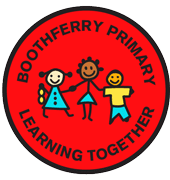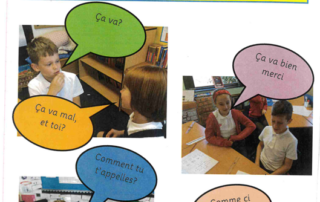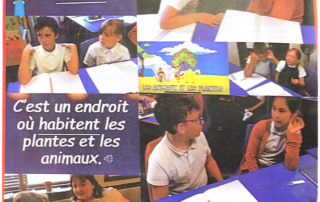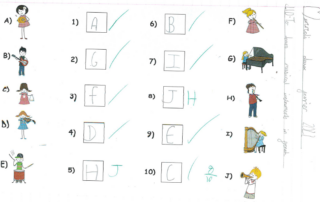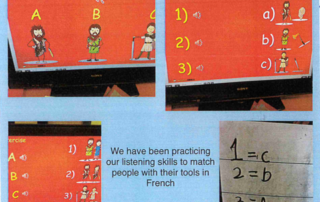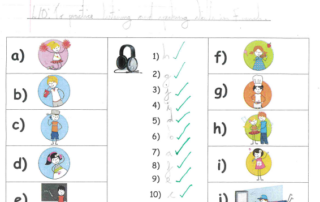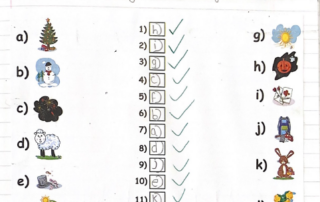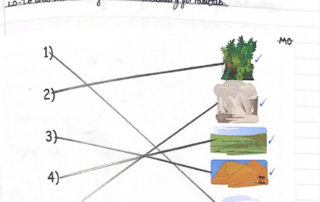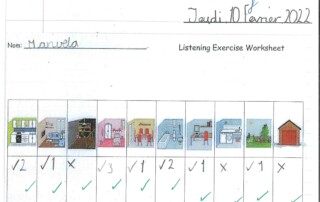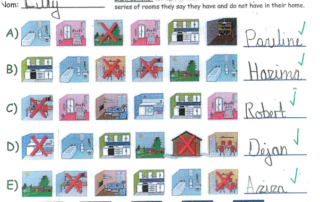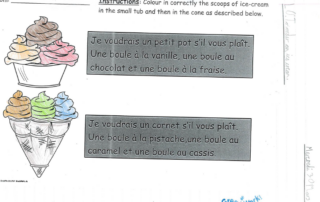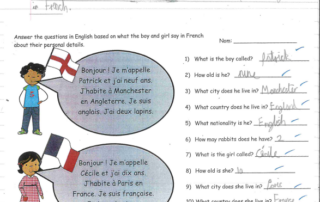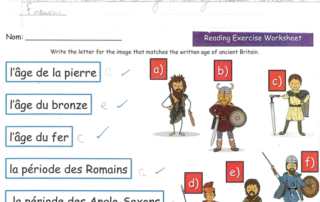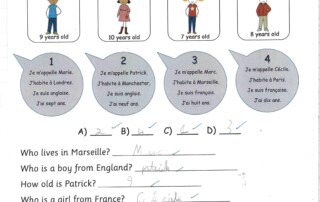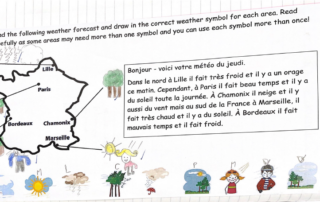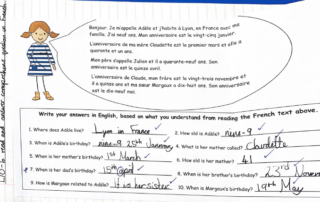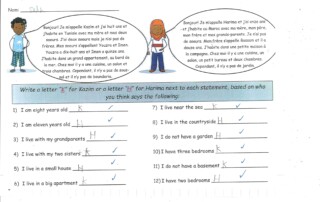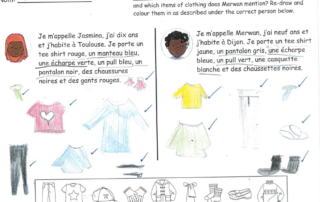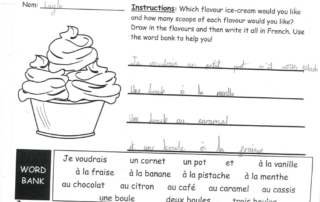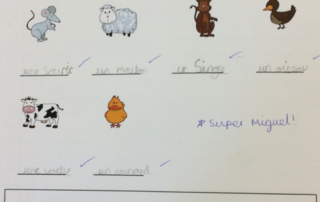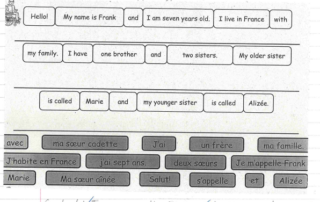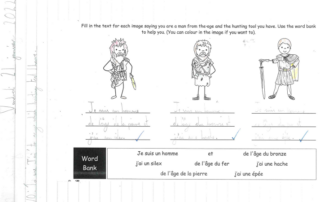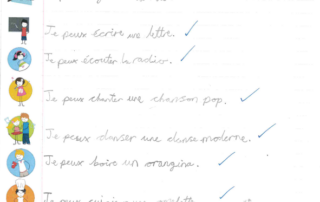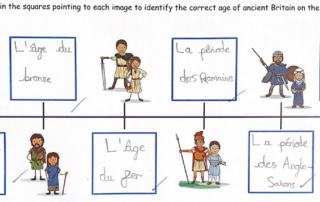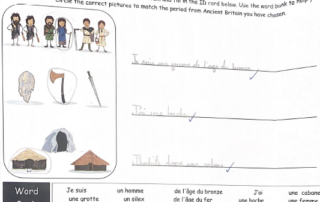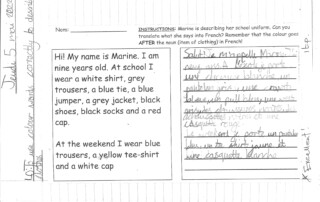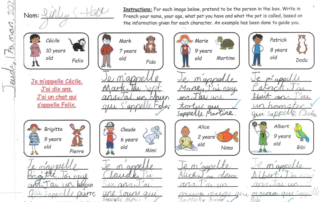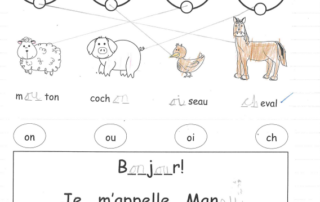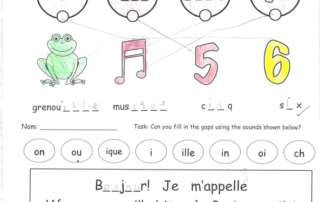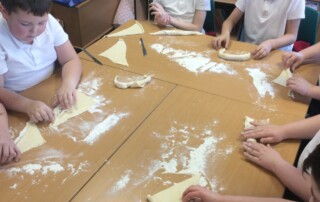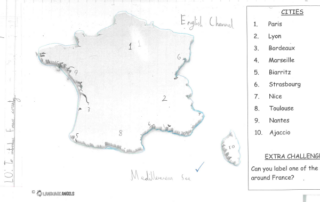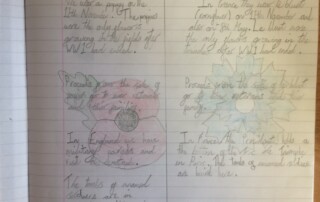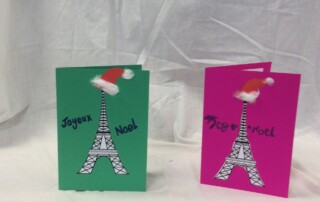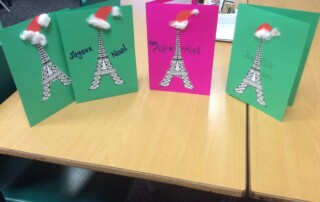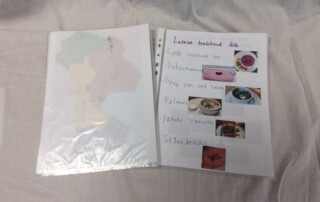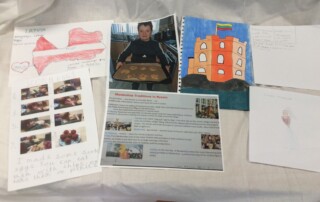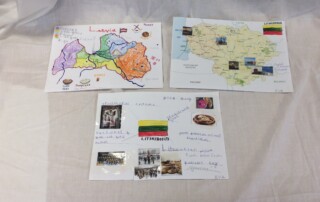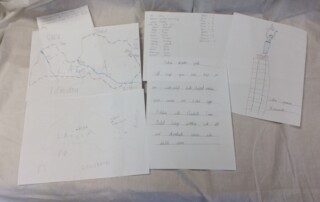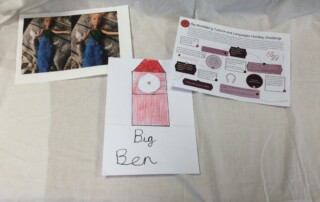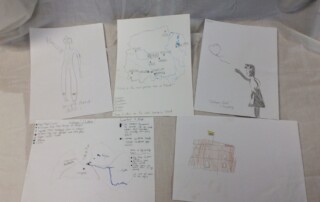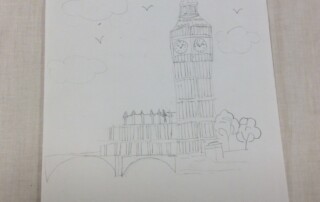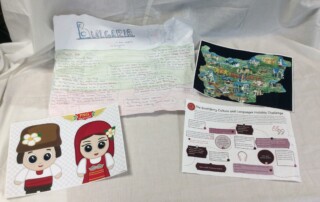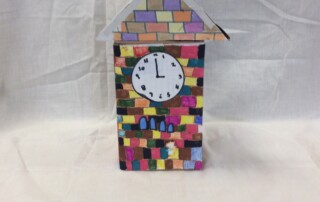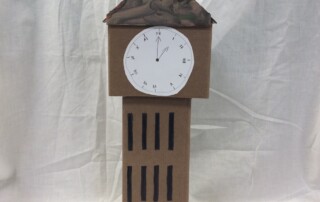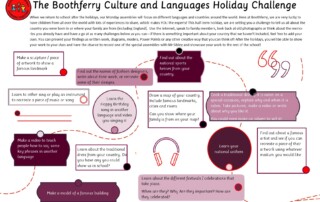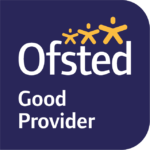Modern Foreign Languages
Our vision: ‘Embracing diversity, building a brighter future together’.
‘Learning at Boothferry inspires us to discover, explore and use our knowledge, skills and understanding to develop ourselves as citizens of tomorrow’.
Curriculum Intent
Boothferry Primary School intends to use the Language Angels scheme of work and resources to ensure we offer a relevant, broad, vibrant and ambitious foreign languages curriculum that will inspire and excite our pupils using a wide variety of topics and themes. All pupils will be expected to achieve their full potential by encouraging high expectations and excellent standards in their foreign language learning – the ultimate aim being that pupils will feel willing and able to continue studying languages beyond key stage 2.
The intent is that all content will be continuously updated and reviewed annually, creating a dynamic programme of study that will be clearly outlined in both long-term and short-term planning. This will ensure that the foreign language knowledge of our pupils progresses within each academic year and is extended year upon year throughout the primary phase and, in so doing, will always be relevant and in line with meeting or exceeding national DfE requirements.
The four key language learning skills; listening, speaking, reading and writing will be taught and all necessary grammar will be covered in an age-appropriate way across the primary phase. This will enable pupils to use and apply their learning in a variety of contexts, laying down solid foundations for future language learning and also helping the children improve overall attainment in other subject areas. In addition, the children will be taught how to look up and research language they are unsure of and they will have a bank of reference materials to help them with their spoken and written tasks going forward. This bank of reference materials will develop into a reference library to help pupils recall and build on previous knowledge throughout their primary school language learning journey.
The intent is that all pupils will develop a genuine interest and positive curiosity about foreign languages, finding them enjoyable and stimulating. Learning a second language will also offer pupils the opportunity to explore relationships between language and identity, develop a deeper understanding of other cultures and the world around them with a better awareness of self, others and cultural differences. The intention is that they will be working towards becoming life-long language learners.
Curriculum Implementation
All classes will have access to a very high-quality foreign languages curriculum using the Language Angels scheme of work and resources. This will progressively develop pupil skills in foreign languages through regularly taught and well-planned fortnightly lessons in KS1 and weekly lessons in KS2 French which will be taught by class teachers.
Children will progressively acquire, use and apply a growing bank of vocabulary, language skills and grammatical knowledge organised around age-appropriate topics and themes – building blocks of language into more complex, fluent and authentic language.
All teachers will know where every child is at any point in their foreign language learning journey through assessment opportunities every half term.
The planning of different levels of challenge (as demonstrated in the various Language Angels Teaching Type categories) and which units to teach at each stage of the academic year will be addressed dynamically and will be reviewed in detail annually as units are updated and added to the scheme. Lessons offering appropriate levels of challenge and stretch will be taught at all times to ensure pupils learn effectively, continuously building their knowledge of and enthusiasm for the language(s) they are learning.
Language Angels are categorised by ‘Teaching Type’ to make it easier for teachers to choose units that will offer the appropriate level of challenge and stretch for the classes they are teaching.
Little Angels (Starting Off and Moving On) units are designed for the very first stages of language learning and aimed at very young learners in the first years of Nursery, Pre-School and KS1 primary phase. The focus is on interactive, immersive teaching with a focus on the spoken and auditory skills. Early Language units are entry level units and are most appropriate for Year 3 pupils or pupils with little or no previous foreign language learning. Intermediate units increase the level of challenge by increasing the amount and complexity (including foreign language grammar concepts) of the foreign language presented to pupils. Intermediate units are suitable for Year 4-5 pupils or pupils with embedded basic knowledge of the foreign language. Progressive and Creative Curriculum units are the most challenging units and are suitable for Year 6 pupils or pupils with a good understanding of the basics of the language they are learning. Grouping units into these Teaching Type categories ensures that the language taught is appropriate to the level of the class and introduced when the children are ready. Children will be taught how to listen and read longer pieces of text gradually in French and they will have ample opportunities to speak, listen to, read and write in French with and without scaffolds, frames and varying levels of support.
Teaching Type 2023/2024

Little Angels (Starting Off and Moving On), Early Language Units (entry level) and Core Vocabulary lessons are designed to run for approximately 30 minutes. Intermediate, Progressive and Creative Curriculum units are designed to run for approximately 45 minutes.
Units, where possible and appropriate, will be linked to class topics and cross curricular themes. During 2023/24 Year 3 will learn about Fruits in French whilst studying the Land, Sea and Sky topic. Year 5 will learn about The Planets in French whilst studying Space Scientists. Children will build on previous knowledge gradually as their foreign language lessons continue to recycle, revise and consolidate previously learnt language whilst building on all four language skills: listening, speaking, reading and writing.
Knowledge and awareness of required and appropriate grammar concepts will be taught throughout all units at all levels of challenge. Teachers are provided with a Progression Map and Grammar Grid (downloadable from the “Curriculum Guidance” area of the Language Angels website) to ensure all children are progressing their foreign language learning skills and are taught the appropriate grammar at the right time in their foreign language learning journey. Grammar rules and patterns will be taught by level of challenge:
- We start with nouns and articles and 1st person singular of high frequency verbs in Early Learning units. For example, je jouer (I play) and je peux (I can).
- We move on to the use of the possessive, the concept of adjectives, use of the negative form, conjunctions/connectives and introduce the concept of whole regular verb conjugation in Intermediate units.
- We end with opinions and introduce the concept of whole high frequency irregular verb conjugation in Progressive units.
Grammar is integrated and taught discreetly throughout all appropriate units. Teachers can also use the specific Grammar Explained units to ensure pupils are exposed to all of the appropriate grammar so they are able to create their own accurate and personalised responses to complex authentic foreign language questions by the end of the primary phase.
The Progression Map shows precisely how pupil foreign language learning across the key skills of speaking, listening, reading, writing and grammar progresses within each Language Angels ‘Teaching Type’ within KS2 and also how the level of learning and progression of each pupil is increased as pupils move across each subsequently more challenging Language Angels ‘Teaching Type’. It is a visual demonstration of the progression that takes place WITHIN a ‘Teaching Type’ and also ACROSS each ‘Teaching Type’.
Boothferry Primary School has a unit planner in place which will serve as an overall ‘teaching map’ outlining for all teachers what each class in each year group will be taught and when it will be taught. Each class in each year group will have an overview of units to be taught during the academic year to ensure substantial progress and learning is achieved. Each teaching unit is divided into 6 fully planned lessons.
- Each unit and lesson will have clearly defined objectives and aims.
- Each lesson will incorporate interactive whiteboard materials to include ample speaking and listening tasks within a lesson.
- Lessons will incorporate challenge sections and desk-based activities that will be offered with three levels of stretch and differentiation. KS1 children are not expected to complete desk based activities.
- Reading and writing activities will be offered in all units. Some extended reading and writing activities are provided so that native speakers can also be catered for.
- Every unit will include a grammar concept which will increase in complexity as pupils move from Early Language units, through Intermediate units and into Progressive units.
- Extending writing activities are provided to ensure that pupils are recalling previously learnt language and, by reusing it, will be able to recall it and use it with greater ease and accuracy. These tasks will help to link units together and show that pupils are retaining and recalling the language taught with increased fluency and ease.
Units are progressive within themselves as subsequent lessons within a unit build on the language and knowledge taught in previous lessons. As pupils progress though the lessons in a unit they will build their knowledge and develop the complexity of the language they use. We think of the progression within the 6 lessons in a unit as ‘language Lego’. We provide blocks of language knowledge and, over the course of a 6-week unit, encourage pupils to build more complex and sophisticated language structures with their blocks of language knowledge.
Pupil learning and progression will be assessed at regular intervals in line with school policy. KS2 Teachers will assess each language skill (speaking, listening, reading and writing) at the end of each half term / unit of learning to be able to provide reference points against which learning and progression in each skill can be demonstrated.
In addition to following the lessons provided in the Language Angels scheme of work and resources, Boothferry Primary School will also provide the following:
- Foreign language celebration assemblies.
- Cookery sessions of traditional foods from the country of the language being studied.
- Lunchtime/after school French club to inspire and engage pupils with learning a foreign language.
Curriculum Impact
As well as each subsequent lesson within a unit being progressive, the teaching type organisation of Language Angels units also directs, drives and guarantees progressive learning and challenge. Units increase in level of challenge, stretch and linguistic and grammatical complexity as pupils move from Early Learning units through Intermediate units and into the most challenging Progressive units. Units in each subsequent level of the teaching type categories require more knowledge and application of skills than the previous teaching type. Activities contain progressively more text (both in English and French) and lessons will have more content as the children become more confident and ambitious with the foreign language they are learning.
Early Learning units will start at basic noun and article level and will teach pupils how to formulate short phrases. By the time pupils reach Progressive units they will be exposed to much longer text and will be encouraged to formulate their own, more personalised responses based on a much wider bank of vocabulary, linguistic structures and grammatical knowledge. They will be able to create longer pieces of spoken and written language and are encouraged to use a variety of conjunctions, adverbs, adjectives, opinions and justifications.
Pupils will continuously build on their previous knowledge as they progress in their foreign language learning journey through the primary phase. Previous language will be recycled, revised, recalled and consolidated whenever possible and appropriate.
Teachers will have a clear overview of what they are working towards and if they are meeting these criteria. They will use the long-term planning documents provided in the form of Language Angels unit planners to ensure the correct units are being taught to the correct classes at each stage of the scholastic year. Short-term planning is also provided in the form of unit overviews (covering the learning targets for each 6-week unit) and individual lesson plans laying out the learning aims and intentions of each individual lesson within a unit. These planning documents ensure that teachers know what to teach and how to teach it in each lesson, across whole units and across each scholastic term.
Pupils will be aware of their own learning goals and progression as each unit offers a pupil friendly overview so that all pupils can review their own learning at the start and at the end of each unit. They will know and will be able to articulate if they have or have not met their learning objectives and can keep their unit learning intention sheets and unit core vocabulary sheets as a record of what they have learnt from unit to unit.
The opportunity to assess pupil learning and progression in the key language skills (speaking, listening, reading and writing) and against the 12 DfE Languages Programme of Study for Key Stage 2 attainment targets is provided at the end of each 6-week teaching unit. This information will be recorded and will be monitored by the Foreign Language Subject Leader who can use this data to ensure teaching is targeted and appropriate for each pupil, class and year group as well as to feedback on progress to SLT and stakeholders. Teachers will be able to record, analyse and access this data easily using the Tracking and Progression Tool that will monitor school, class and individual progress in the foreign language. Pupils will also be offered feedback to ensure they are also aware of their own progress.
Children are expected to make good or better than good progress in their foreign language learning and their individual progress is tracked and reported to pupils and parents / carers in line with school recommendations.
If pupils are not progressing in line with expectations, this will be identified in the End of Unit Skills Assessments provided in the Language Angels Tracking & Progression Tool.
Progression of Skills
If you would like to read the Progression of Skills document, please click below.
Examplar of Work
Please click on one of the links below to quickly move to that section.
Speaking
At Boothferry Primary School, children will be taught to:
- Listen attentively to spoken language and show understanding by joining in and responding
- Explore the patterns and sounds of language through songs and rhymes and link the spelling, sound and meaning of words
- Engage in conversations: ask and answer questions; express opinions and respond to those of others; seek clarification and help
- Speak in sentences, using familiar vocabulary, phrases and basic language structures
- Develop accurate pronunciation and intonation so that others understand when they are reading aloud or using familiar words and phrases
Listening
At Boothferry Primary School, children will be taught to:
- Listen attentively to spoken language and show understanding by joining in and responding
- Explore the patterns and sounds of language through songs and rhymes and link the spelling, sound and meaning of words
- Develop accurate pronunciation and intonation so that others understand when they are reading aloud or using familiar words and phrases
Reading
At Boothferry Primary School, children will be taught to:
- Read carefully and show understanding of words, phrases and simple writing
- Appreciate stories, songs, poems and rhymes in language
- Broaden their vocabulary and develop their ability to understand new words that are introduced into familiar written material, including through a dictionary
Writing
At Boothferry Primary School, children will be taught to:
- Write phrases from memory, and adapt these to create new sentences, to express ideas clearly
- Describe people, places, things and actions orally and in writing
Phonics
French Club and French Culture
Languages Challenges
Modern Foreign Languages Long-term Plan
“My son’s teacher is creative, enthusiastic and genuinely cares about him as an individual .“
“We want to thank you for welcoming my family when we moved here (from Bulgaria).”
“My children have come on and made progress socially and academically since joining.“
“..closeness between all age groups and years.“
“Miss Pulleyn is fantastic“
Boothferry at Young Voices…..Just WOW! What an experience.”
“The Head teacher and deputy are fab, they join in everything.”
“Pupils’ personal development and welfare are outstanding. Pupils thrive and are keen to learn. They know how to look after their
wellbeing and how to keep safe. The school is an inclusive and happy place.”
“This school meets our expectations in every way.“
“Being part of their learning – it doesn’t just stay in the classroom.”
“Leaders use funding well to ensure that pupils with special educational needs and/or disabilities (SEND) make strong progress from their different starting points.”
“The bike loan scheme.My family also like the school bank.“
“Children get off to a strong start in early years. This is due to effective leadership and skilful teaching. The proportion of children reaching a good level of development is improving yearon-year.”
“The joy of the teachers who greet the children and parents daily.“
“the amount of effort put in by the teachers to make topics interesting is brilliant.“
“School leaders have taken effective action to ensure that pupils make at least good progress from their low starting points in reading,
writing and mathematics in all year groups.”
“My children are thriving as the school is committed to learning and progression.“
“The stimulating learning environment. “
“Senior leaders lead by example, modelling what is expected of all staff. Teachers feel valued and respected.”
“Leaders and staff have significantly improved the teaching of reading. Pupils are enthusiastic and frequent readers.”
“Senior leaders lead by example, modelling what is expected of all staff. Teachers feel valued and respected.”
“School leaders are ambitious and highly knowledgeable about teaching and learning.”
“Pupils who speak English as an additional language make rapid progress. Disadvantaged pupils are also supported well to make good,
and sometimes better, progress in reading, writing and mathematics.”
History day was amazing. Brilliant idea.
“I love the fact that senior members of staff know the names of the children.“
“My kids love the fruit on the snack table.“
“The choice to do a traditional nativity was great !.“
“Thank you for treating my child like your own.“
“Opening the school doors at 8.40am has made it much easier as it is less crowded.“
“The photography club is brilliant, I think introducing things like this is brilliant for the children.“
“Teachers, including those who are new to teaching, have high expectations, and they plan creative lessons that spark pupils’ interest and inspire them to do well.”
“The after school activities, film nights and discos.“
“You can approach any member of staff and they help you.“
“Open weeks in Foundation allows parents to enjoy school as much as our children.“
“We can only applaud the ingenuity & continued compassion of the young people at Boothferry.”
“I feel the school has advanced with regards to the appropriate curriculum for different age groups.“
“The headteacher, deputy headteacher and the assistant headteacher make an effective team. They sustain a culture of continuous i improvement through the school’s vision and specific learning goals, which include resilience, morality and adaptability.”
“The headteacher, senior leaders and governors are ambitious for pupils. Their determination has made Boothferry Primary a flourishing and successful school.”
“The best thing about this school, when I ask my child this question, he said Mrs Emmerson. “
“The teaching of phonics is a strength and enables pupils to make rapid improvement in their early literacy skills. ”
“The curriculum is well designed to include a range of exciting themes, visits and visitors to enhance pupils’ learning. Pupils become
confident individuals who are well prepared for the next stage of their education.”
“When ever I have had a problem the staff on the whole have been sympathetic and helpful.“
“I love seeing school events on Twitter.“
“The friendly atmosphere, the safe environment & the teachers’ encouragement.”
“My children are developing very well in school.“
“the school gives me advice as a parent so I can help my daughter.“
